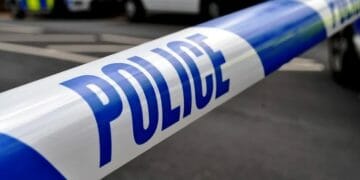
A talented and well respected shepherd and farm manager who honed his skills in wartime Martindale has died aged 91.
Sid Scott was born at Dalehead, in Martindale, in 1930, the second youngest of Jim and Martha who had seven sons and two daughters and who farmed Dalehead and Boredale Head simultaneously.
Raised and moulded on these two high fell farms, widely considered as among the most challenging in the district, Sid developed into a tough, dedicated and knowledgeable stockman but with a genuine dalesman’s dry humour.
Life in Martindale in the 1930s was hard and Sid had to walk four miles each way to school aged five as the family had no car and all farm work was by hand and by horse power.
It was not until 1955 that the family acquired its first tractor, a Grey Fergy. He had to learn how to handle sheepdogs skilfully from a young age as for instance four or five flocks of sheep from various Martindale farms had to be fetched down the Howes in a queue to load into wagons near the Howtown Hotel as it was too dangerous for a truck to descend the switchbacks with a full load.
Sid left school at 14 and wanted to be a vet, but the family had insufficient funds to see him through vet school so he went to be a hired man at Howstead Brow nearby. When he returned to farm Dalehead, luxuries were few and he had to share a bed with his younger brother Fred and the bedroom with hired man Tommy Mounsey until Sid married Freda Allen.
Sid met his future bride at a dance in the village hall at Pooley Bridge, where Freda was warned off the Scott boys as they were considered a bit rough. Freda persevered and they married in Shap on May 30, Whit Monday, 1955, “between lambing and haytime”, remembers Freda. Even weddings had to fit around the farming calendar.
Sid’s farming career was framed by two of the most catastrophic winters of the 20th century, 1946-47 and 1963.
So wet was the summer of 1946 that Sid had to sell that year’s weaned calves for a pittance as no one wanted them as so little hay had been made that summer.
Then came deep snow in 1947 and Sid recalled how their carthorse walked over the gates on frosted snow for many months. So bad was the winter that hundreds of their 1,200-strong flock of Swaledales died and only 16 lambs survived the spring. His father died soon after, in 1948.
With very few livestock left, Sid knuckled down with his mother and brothers Fred and Jim to rebuild the farms. By 1962 when his mother died Sid and Freda had three daughters, but he did not have enough money to carry on in the two tenant farms.
He was headhunted by Captain Anthony Lowther to manage Whitbysteads Hill Farm, Askham, but was locked into Martindale by huge snowfalls in February, 1963. It was all he could do to keep the stock of sheep alive for the incoming tenant.
Life in Askham was a bit kinder than Martindale and the couple had a son in 1966. Freda joined Sid in the team at Whitbysteads in 1970 as the housekeeper for Captain and Mrs Lowther. Sid built up a Swaledale flock and managed a herd of Shorthorns and Galloways.
He was widely respected in auction marts throughout Cumbria and had a knack for spotting bargains with potential that had been passed over by others, whether it was a thin, hairy Angus from Ireland bought in Carlisle or a Bluefaced Leicester tup out of the fat ring in Penrith.
Sid worked at Whitbysteads for over 30 years and nurtured a succession of young staff in the art of hill shepherding with great patience and skill. These included Will Lowther, now Lord Lonsdale. He once had to cut young Will’s hair with sheep shears after a disaster when painting the farm buildings. Recently he said proudly that he had “cut the hair of an Earl of Lonsdale”.
After a period of decline at Whitbysteads, hastened by the long illness and death of Captain Lowther, in 1981 Sid oversaw a rebirth of the farm with Lavinia, widow of his former boss.
They crafted a close and unusual partnership as Mrs Lowther was born and raised in California, USA, and was fairly inexperienced in hill farming matters.
They expanded the Swaledale flock and built cattle numbers up to one hundred.
Sid retired in 1998 to Melkinthorpe, where he relished the proximity of some active farms and the company of a group of retired farmers who lived in the village.
He continued to work part-time at Whitbysteads for Mrs Lowther’s successor, Tom, and his last shepherding assignment was gathering in the whole flock of sheep in 2001 during the foot and mouth epidemic to be loaded into wagons destined for slaughter at Great Orton, under the so-called Voluntary Depopulation Scheme.
This was the end of all the blood lines of sheep he had nurtured for over 30 years. He was without rancour, commenting at the time how “the ewes loaded so well” into the trucks.
He was a keen follower of the Ullswater Foxhounds and walked hounds in the summer for many years, returning them to the pack at Patterdale Dog Day where he would show his sheepdogs, too.
His true passion was his family and he is survived by his wife Freda, daughters, Evelyn, Joan and Brenda, son David and six grandchildren and two great-grandchildren. The funeral service was held at Temple Sowerby crematorium.































